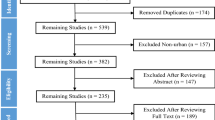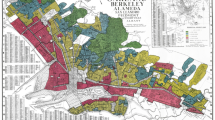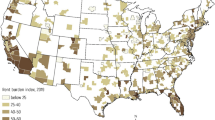Abstract
This article analyses the combined effect on subjective well-being of rural versus urban environments and a country’s level of economic development. There is a great deal of controversy regarding the subjective well-being of people in different places. Fischer’s works report greater happiness among village inhabitants than among urban residents. However, in ‘Urbanism as a way of life’, Wirth demonstrates the attractiveness of the urban environment in contributing to subjective well-being. Our data set includes 29 countries participating in the 2012 ESS. The results confirm the hypothesis that in wealthier countries, rural living standards are high enough to create a higher level of subjective well-being; while in less developed countries the rural environment cannot compete with urban resources for creating subjective well-being.
Similar content being viewed by others
Notes
In fact, not long ago French President Nicolas Sarkozy organised a commission to study designing another indicator that might better measure well-being in France (Stiglitz et al. 2010).
Tönnies (2004 [1887]) was one of the classic authors that reinforced the idea that city life eroded community ties.
This argument is similar to the de-growth theory developed by Latouche (2006).
For more information on the weighting of the samples used in the ESS, see: www.europeansocialsurvey.org/docs/methodology/ESS_weight_data_1.pdf.
References
Adams, R. E. (1992). Is happiness a home in the suburbs? The influence of urban versus suburban neighborhoods on psychological health. Journal of Community Psychology, 20, 353–372.
Amato, P. R., & Zuo, J. (1992). Rural poverty, urban poverty and psychological well-being. The Sociological Quarterly, 33(2), 229–240.
Ball, R., & Chernova, K. (2008). Absolute income, relative income and happiness. Social Indicators Research, 88, 497–529.
Berry, B. J. L., & Okulicz-Kozaryn, A. (2009). Dissatisfaction with city life: A new look at some old questions. Cities, 26(3), 117–124.
Berry, B. J. L., & Okulicz-Kozaryn, A. (2011). An urban–rural happiness gradient. Urban geography, 32(6), 871–883.
Borensztein, E., Mauro, P., Ottaviani, M., & Claessens, S. (2004). The case for GDP-Indexed bonds. Economic Policy, 19(38), 156–216.
Borja, J., & Castells, M. (1997). Local and global: The management of cities in the information age. Abingdon: Earthscan Publications Limited.
Bourke, L., & Geldens, P. M. (2007). Subjective well-being and its measuring for young people in a Rural Australian Center. Social Indicators Research, 82(1), 165–187.
Castells, M. (2010). The rise of the network society. Oxford: Wiley-Blackwell.
Ciccone, A., & Hall, R. E. (1996). Productivity and the density of economic activity. The American Economic Review, 86(1), 54–70.
Davey, G., Chen, Z., & Lau, A. (2009). ‘Peace in thatched hut—that is happiness’: Subjective well-being among peasants in rural China. Journal of Happiness Studies, 10(2), 239–252.
Di Tella, R., MacCulloch, R., & Oswald, A. (2003). The macroeconomics of happiness. Review of Economics and Statistics, 85, 809–827.
Diener, E., & Oishi, S. (2000). Money and happiness: Income and subjective well-being across nations. In E. Diener & E. Suh (Eds.), Culture and subjective well-being. Cambridge, MA: MIT Press.
Dixit, A. K., & Stiglitz, J. E. (1977). Monopolistic competition and optimum product diversity. The American Economic Review, 67(3), 297–308.
Easterlin, R. A. (1974). Does economic growth improve the human lot? Some empirical evidence. In P. A. David & M. W. Reder (Eds.), Nations and households in economic growth: Essays in honour of Moses Abramowitz. New York: Academic Press.
Easterlin, R. A. (2001). Income and happiness: Towards a unified theory. Economic Journal, 111, 465–484.
Easterlin, R. A., Angelescu, L., & Zweig, J. S. (2011). The impact of modern economic growth on urban–rural differences in subjective well-being. World Development, 39(12), 2187–2198.
Evans, R. J. (2009). A comparison of rural and urban older adults in Iowa on specific markers of successful aging. Journal of Gerontological Social Work, 52(4), 423–438.
Fischer, C. S. (1975). Toward a subcultural theory of urbanism. American Journal of Sociology, 80, 1319–1341.
Fischer, C. S. (1984 [1976]). The urban experience (2nd ed.). New York: Harcourt Brace Jovanovich.
Fischer, C. S., Jackson, R. M., Stueve, C. A., Gerson, K., Jones, L. M., & Baldassare, M. (1977). Networks and places: Social relations in the urban setting. New York: Free Press.
Florida, R., Mellander, C., & Rentfrow, P. J. (2013). The happiness in cities. Regional Studies, 47(4), 613–627.
Frey, B. S. (2008). Happiness. A revolution in economics. Cambridge: The MIT Press.
Frey, B. S., & Stutzer, A. (2002). Happiness and economics. How the economy and the institutions affect well-being. Princeton: Princeton University Press.
Garreau, J. (1992). Edge city: Life on the new frontier. New York: Anchor Books.
Halman, L., & Draulans, V. (2006). How secular is Europe? The British Journal of Sociology, 57(2), 263–288.
International Monetary Fund. (2012). Data and statistics: World Economic Outlook Database, September 2012. Gross domestic product based on purchasing-power-parity per capita. GDP http://www.imf.org/external/pubs/ft/weo/2011/02/weodata/weorept.aspx?
Ivanova, I., Arcelus, F. J., & Srinivasan, G. (1999). An assessment of the measurement properties of the human development index. Social Indicators Research, 46(2), 157–179.
Koopmans, T. A., Geleijnse, J. M., Zitman, F. G., & Giltay, E. J. (2010). Effects of happiness on all-cause mortality during 15 years of follow-up: The Arnhem Elderly Study. Journal of Happiness Studies, 11(1), 113–124.
Latouche, S. (2006). Le pari de la décroissance. Paris: Fayard.
Layard, R. (2003). Good jobs, bad jobs. London School of Economics. Centre for Economic Performance. Occasional papers 19.
Layard, R. (2011 [2005]). Happiness. Lessons from a new science (2nd ed.). London: Penguin.
Leyden, K. M., Goldberg, A., & Michelbach, P. (2011). Understanding the pursuit of happiness in ten major cities. Urban Affairs Review, 47(6), 861–888.
Lin, C.-H. A., Lahiri, S., & Hsu, C.-P. (2014). Happiness and regional segmentation: Does space matter? Journal of Happiness Studies, 15(1), 57–83.
Lind, N. C. (1992). Some thoughts on the human development index. Social Indicators Research, 27, 89–101.
Lyubomirsky, S., King, L., & Diener, E. (2005). The benefits of frequent positive affect: Does happiness lead to success? Psychological Bulletin, 131(6), 803–855.
Marmot, M. (2004). Status syndrome. London: Bloomsbury.
Martikainen, L. (2009). The many faces of life satisfaction among Finnish young adults. Journal of Happiness Studies, 10(6), 721–737.
McGillivray, M. (1991). The human development index: Yet another redundant composite development indicator? World Development, 19(10), 1461–1468.
Pacione, M. (2001). Urban geography: A global perspective. London: Routledge.
Palisi, B. J., & Canning, C. (1983). Urbanism and social psychological well-being: A cross-cultural test of three theories. The Sociological Quarterly, 24, 527–543.
Palisi, B. J., & Ransford, H. E. (1987). Effects of urbanism, race, and class on happiness and physical health. Sociological Spectrum, 7, 271–295.
Putnam, R. (2000). Bowling alone: The collapse and revival of American community. New York: Simon and Schuster.
Stiglitz, J. E. (1983). The theory of local public goods twenty-five years after Tiebout: A perspective. In G. R. Zodrow (Ed.), Local provision on public services: The Tiebout model after twenty-five years (pp. 17–53). New York: Academic Press.
Stiglitz, J. E. (2000). Economics of the public sector (3rd ed.). New York: W. W. Norton and Company.
Stiglitz, J. E., Sen, A., & Fitoussi, J.-P. (2010). Mis-measuring our lives. Why GDP doesn’t add up. New York: The New Press.
Tiebout, C. M. (1956). Pure theory of local expenditures. Journal of Political Economy, 64, 416–424.
Tönnies, F. (2004 [1887]). Community and society. New Brunswick, NJ: Transaction Publishers.
Veenhoven, R. (1991). Is happiness relative? Social Indicators Research, 24, 1–34.
Veenhoven, R. (2001). Qualita’ della vita e felicita. In G. de Girolamo, A. Becchi, F. S. Coppa, D. De Leo, G. Neri, P. Rucci, & P. Scocco (Eds.), Salute e Qualita della Vita. Torino: Centro Scientifico Editore.
Wills-Herrera, E., Islam, G., & Hamilton, M. (2009). Subjective well-being in cities: A multidimensional concept of individual, social and cultural variables. Applied Research Quality Life, 4(2), 201–221.
Wirth, L. (1938). Urbanism as a way of life. American Journal of Sociology, 44(1), 1–44.
Wirth, L. (1956). Rural–urban differences. In L. Wirth (Ed.) Community life and social policy (pp. 172–176). Chicago: The University of Chicago Press (edited by Elizabeth Wirth Marvik and Albert J. Reiss, Jr.).
Acknowledgments
Financial support for this research was provided by the Ministry of Economy and Competitiveness of Spain, Project # CSO2013-46440-P.
Author information
Authors and Affiliations
Corresponding author
Rights and permissions
About this article
Cite this article
Requena, F. Rural–Urban Living and Level of Economic Development as Factors in Subjective Well-Being. Soc Indic Res 128, 693–708 (2016). https://doi.org/10.1007/s11205-015-1051-1
Accepted:
Published:
Issue Date:
DOI: https://doi.org/10.1007/s11205-015-1051-1




